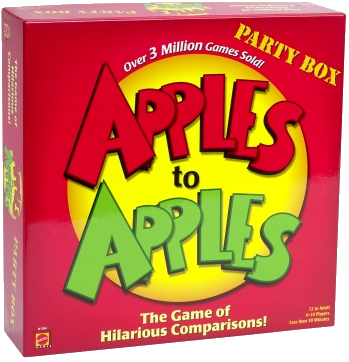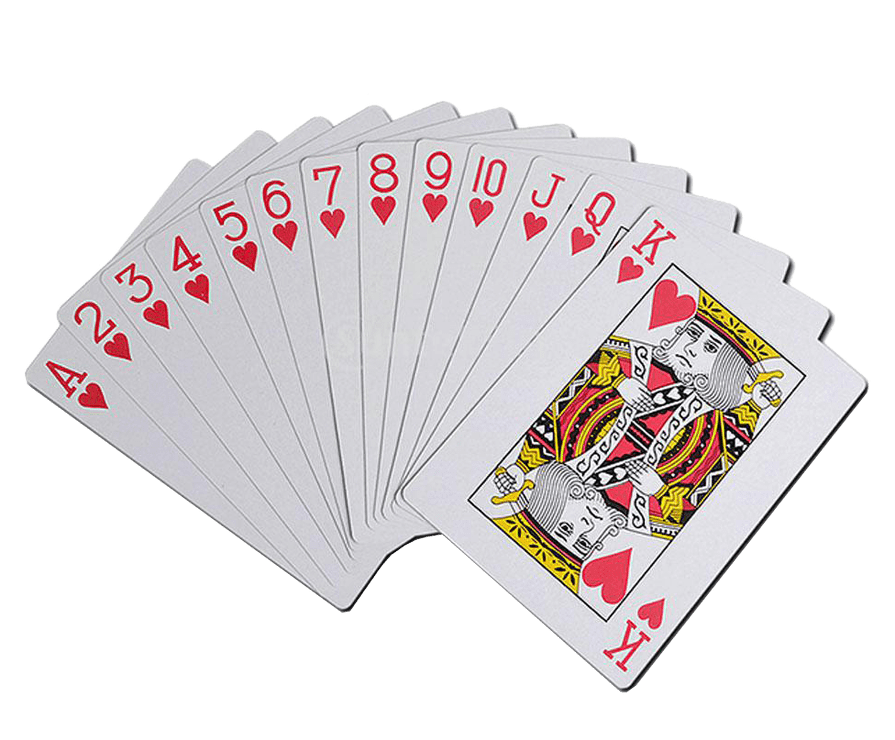Apples to Apples™ - designed for middle-school aged children 9 and up
By Pegasus Spiele, Out of the Box Publishing, and Mattel
Apples to Apples™

- Developer: Matthew Kirby & Mark Alan Osterhaus
- Publisher: Pegasus Spiele, Out of the Box Publishing, and Mattel
- Release Date: December 22, 1999
- Players: 4 − 10
- Game Rating: 12 and up
Information
Apples to Apples™ was chosen by Mensa International in 1999 as a “Mensa Select” prize winner, an award given to five games each year. It was also named “Party Game of the Year” in the December 1999 issue of Games magazine and received the National Parenting Center's seal of approval in May 1999.
Rules
Each player is dealt seven red apple cards; on each card is printed a noun or noun phrase, or possibly a gerund.
The judge (a chosen player) draws a “green apple” card on which is printed an adjective (scary, frivolous, patriotic, and so forth), and places it face-up on the table for everybody to see. Then each player (except the judge) chooses a card that they think is the best match for the green apple card, and places it face-down. The judge shuffles the red apple cards, reads them (often aloud), and decides which noun is the best match for the adjective. This decision is subjective; the official rules encourage the judge to pick the match that is “most creative, humorous or interesting.”
The player who submitted the chosen red apple card wins the round, and takes the green apple card to signify the win. All players then draw red cards until they have seven again, and the role of “judge” may pass to another person (generally going to the next player in line, though some rules have the round's winner becoming judge). Some editions of the game suggest discounting the last red-apple card played, to encourage players to place their cards down more quickly.
The winner is the first player to accumulate a pre-designated number of green apple cards; the more players, the lower the total.
Variations
- Apple Potpourri: Each player selects a red apple card from his or her hand before the judge turns over the green apple card. After the red apple cards are played, the judge turns over a green apple card. The judge selects the winning red card as usual.
- Apple Traders: To stir things up, on each turn, each player selects one red apple card from his or her hand to pass on to the player on his or her left. Players pass the cards after drawing their seventh card but before the judge selects a green apple card.
- Apple Turnovers: The roles of red and green cards are reversed, with players using adjectives to describe the given noun. This can be stymied by the relatively low number of green cards in the box (a third as many as reds).
- Apples Eye View: The Judge must pick a red apple card based upon the point of view of somebody, or something else (a house cat, Rush Limbaugh, Bill Clinton, a speck of dust, etc). The player to the left of the Judge determines which point of view the Judge must use for that round.
- Baked Apples: After each player plays one card, the judge lays them face up and, instead of announcing the winner, identifies the non-winning cards first, each time explaining why it was not selected. The role of judge passes on to the winner of each round.
- Big Apples: Two or more players boasting that the judge will pick their card can agree to each wager one of their green apple cards. If the judge selects one of their red apple cards, that player wins the green apple card and all of the wagered green apple cards. If the judge does not pick one of their red apple cards, the wagered cards are forfeited to the bottom of the card stack.
- Crab Apples: The red apple cards are judged on how unlike they are to the green apple card. The card least like the green apple card wins.
- 2 for 1 Apples: The judge turns over two green apple cards to start the round. Each player selects the red apple card from his or her hand that is best described by both green apple cards. After the judge selects a red apple card, both of the green apple cards are awarded to the winner.
- Infinite Apples: Rather than playing to a set number of green apple cards, play stops whenever the players feel like stopping. The winner is the one with the greatest quantity of green apple cards.
- Apple Timers: Rather than playing to a set number of green apple cards, play stops when a certain time limit has been reached. This is sometimes coupled with time limits on each round, for both submissions and judging of red apple cards. The winner is the player with the most green apple cards.
Equipment
The original boxed set contained:
- 108 green cards (green apples) each of which has an adjective printed on one side.
- 324 red cards (red apples) each of which has a noun printed on one side.
- A tray for holding the cards.
Four expansion sets were available adding 72 extra green apple cards and 216 extra red apple cards each. In 2002, Expansion Set 3 won the Origins Award for Best Card Game Expansion or Supplement of 2002.
As of 2005, the original set and its expansions have been retired and replaced by a Party Box with the combined contents of the basic set and its first two expansions, and Party Box Expansion 1 set with the combined contents of the third and fourth expansions, and a Party Box Expansion 2, which contains new cards.
On September 7, 2007, Out of the Box Publishing sold the rights for Apples to Apples to Mattel.
Official distributions
Below is a list of currently available distributions of Apples to Apples:
- Party Box: a combination of earlier Expansion Sets
- Party Crate: a premium version of the Party Box, which contains the same cards packaged in a wooden box
- Party Box Expansion One
- Party Box Expansion Two
- Junior
- Kids
- Bible Edition
- Jewish Edition
- Junior Jewish Edition
- German Edition
- Yiddish Edition
- Disney Edition
- British Isles Edition
- Spanish edition: Manzanas con manzanas
- To Go: a portable version of Apples to Apples for use while traveling that includes all new cards.
- Family Edition
- Sour Apples to Apples: a variant of Apples to Apples which comes in a black box and sports a new Apple-character with a somewhat upset face, and a modified game logo. The game follows traditional rules, except the judge also chooses what they deem to be the worst answer, in addition to the best answer. The game includes a “spinning apple” which is spun by the player of the worst answer and a “punishment” displayed. Punishments include removal of the ability to speak for the next round, forcing the losing player to play their chosen card before the next round of judging begins, and other similar concepts. Additionally, red and green cards are merged together so half of the face of the card is a red card and half is a green card, while eliminating the explanatory text traditionally seen on Apples to Apples cards. Sold only at Target.

